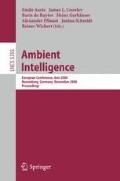Abstract
This paper presents the results of a study on how elderly people perceive an intelligent system, embedded in their home, which should enable them to live independently longer. Users of a motion sensor system were interviewed about their experiences. A sensor system that autonomously works as well as a manipulated version was studied. The manipulation contained a touch screen that informed the users if the gathered information was correct before sending it to caregivers, so more control over personal information was provided. To test the use intention of the motion sensor system Spiekermann’s Ubiquitous Computing Acceptance Model of was used. This study shows that people, who perceive more control over their wellbeing, show more use intention. And that the subjective norm influences their acceptance. This study shows that acceptance models for Ambient Intelligence application in care situations need to be developed.
Access this chapter
Tax calculation will be finalised at checkout
Purchases are for personal use only
Preview
Unable to display preview. Download preview PDF.
References
Aarts, E.: Ambient intelligence: A multimedia perspective. IEEE Trans. Multimedia 11(1), 12–19 (2004)
Punie, Y. (ed.): Institute for Prospective Technological Studies: A social and technological view of Ambient Intelligence in Everyday Life. What bends the trend? (2003)
Brey, P.: Freedom and privacy in Ambient Intelligence. Ethics and Information Technology 7(3), 157–166 (2005)
Bohn, J., Coroama, V., Langheinrich, M., Mattern, M., Rohs, M.: Social, economic, and ethical implications of ambient intelligence and ubiquitous computing. In: Aarts, E., Weber, W., Rabaey, J. (eds.) Ambient Intelligence. Springer, Heidelberg (2004)
Spiekerman, S.: Perceived control: Scales for privacy in ubiquitous computing environments. In: Proceedings of the 10th International Conference on User Modeling, Edinburgh (2005)
ISTAG: Scenarios for ambient intelligence in 2010, Institute for Prospective Technological Studies (IPTS), Seville (2001)
Friedewald, M., Gutwirth, S., Punie, Y., Wright, D., Vildjiounaite, E.: Safeguards in a World of Ambient Intelligence. In: Security in Pervasive Computing. Springer, Heidelberg (2007)
UbiComp 2007: Proceedings Ubiquitous Computing 9th International Conference (2007)
Ben Allouch, S., Van Dijk, J.A.G.M., Peters, O.: Our future home: A content analysis of ambient intelligence promotional material. In: The annual meeting of the International Communication Association, Dresden, Germany (2006)
Spiekermann, S.: User Control in Ubiquitous Computing: Design Alternatives and User Acceptance (2007)
Spiekermann, S.: Privacy Enhancing Technologies for RFID in Retail- An Empirical Investigation. In: Krumm, J., Abowd, G.D., Seneviratne, A., Strang, T. (eds.) UbiComp 2007. LNCS, vol. 4717, pp. 56–72. Springer, Heidelberg (2007)
Niemelä, M., Fuentetaja, R.G., Kaasinen, E., Gallardo, J.L.: Supporting Independent Living of the Elderly with Mobile-Centric Ambient Intelligence: User Evaluation of Three Scenarios. In: Schiele, B., Dey, A.K., Gellersen, H., de Ruyter, B., Tscheligi, M., Wichert, R., Aarts, E., Buchmann, A. (eds.) AmI 2007. LNCS, vol. 4794, pp. 91–107. Springer, Heidelberg (2007)
Brown, B., Taylor, A.S., Izadi, S., Sellen, A., Kaye, A.A., Eardley, R.: Locating Family Values: A Field Trial of the Whereabouts Clock. In: Krumm, J., Abowd, G.D., Seneviratne, A., Strang, T. (eds.) UbiComp 2007. LNCS, vol. 4717, pp. 354–371. Springer, Heidelberg (2007)
Janse, M., Vink, P., Soute, I., Boland, H.: Perceived Privacy in Ambient Intelligent Environments. In: Proceedings of Context Awareness and Trust 2007 (CAT 2007), First International Workshop on Combining Context with Trust, Security and Privacy, New Brunswick (2007)
de Ruyter, B., Aarts, E., Markopoulos, P., Ijsselsteijn, W.: Ambient Intelligence Research in HomeLab: Engineering the User Experience Ambient Intelligence. In: Weber, W., Rabbaey, J., Aarts, E. (eds.) Ambient Intelligence. Springer, Berlin (2005)
Kidd, C., Abowd, G., Atkeson, C., Essa, I., MacIntyre, B., Mynatt, E., Starner, T.: The Aware Home: A living laboratory for ubiquitous computing research. In: Streitz, N.A., Hartkopf, V. (eds.) CoBuild 1999. LNCS, vol. 1670. Springer, Heidelberg (1999)
Intille, S.S., Munguia Tapia, E., Rondoni, J., Beaudin, J., Kukla, C., Agarwal, S., Bao, L., Larson, K.: Tools for studying behavior and technology in natural settings. In: Dey, A.K., Schmidt, A., McCarthy, J.F. (eds.) UbiComp 2003. LNCS, vol. 2864, pp. 157–174. Springer, Heidelberg (2003)
Venkatesh, V., Morris, M., Davis, G., Davis, F.: User acceptance of information technology: toward a unified view. MIS Quarterly 27(3), 425–478
Ben Allouch, S.: The design and anticipated adoption of ambient intelligence in the home. Dissertation (2008)
Davis, F.: Perceived usefulness, perceived ease of use, and user acceptance of information technology. MIS Quarterly 13(3), 319–340 (1989)
Yang, H., Yoo, Y.: It’s all about attitude: revisiting the technology acceptance model. Decision Support Systems 38(1), 19–31 (2004)
Featherman, M.S., Pavlou, P.A.: Predicting e-service adoption: a perceived risk facets perspective. In: Proceedings of the Eighth Americas Conference on Information Systems (2002)
Kaplan, L.B., Syzbillo, G.J., Jacoby, J.: Components of perceived risk in product purchase: A cross-validation. Journal of Applied Psychology 59, 287–291 (1974)
Het Rathenau Instituut (eds): Ambient intelligence: toekomst van de zorg, of zorg van de toekomst? (2007)
Patton, M.Q.: Qualitative Research and Evaluation Methods. Sage, Thousand Oaks (2002)
Zajicek, M.: Successful and available: interface design exemplars for older users. Interacting with Computers 16(3), 411–430 (2004)
Fulk, J., Steinfield, C.W., Schmitz, J., Power, J.G.: A Social Information Processing Model of Media Use in Organizations. Communication Research 14(5), 529–552 (1987)
Author information
Authors and Affiliations
Editor information
Editors and Affiliations
Rights and permissions
Copyright information
© 2008 Springer-Verlag Berlin Heidelberg
About this paper
Cite this paper
Zaad, L., Ben Allouch, S. (2008). The Influence of Control on the Acceptance of Ambient Intelligence by Elderly People: An Explorative Study. In: Aarts, E., et al. Ambient Intelligence. AmI 2008. Lecture Notes in Computer Science, vol 5355. Springer, Berlin, Heidelberg. https://doi.org/10.1007/978-3-540-89617-3_5
Download citation
DOI: https://doi.org/10.1007/978-3-540-89617-3_5
Publisher Name: Springer, Berlin, Heidelberg
Print ISBN: 978-3-540-89616-6
Online ISBN: 978-3-540-89617-3
eBook Packages: Computer ScienceComputer Science (R0)

